Service emphasizes continuing need for help
Vigil remembers earthquake victims, survivors
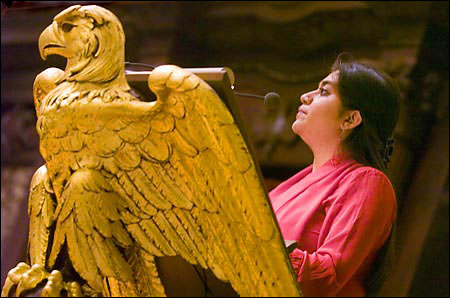
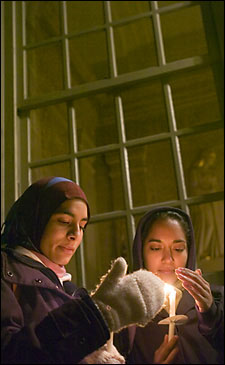
Better to light a single candle than to curse the darkness, but better still to dig deep into your pockets and make a real contribution to relieve human suffering – that was the theme that reverberated through an evening ceremony held Nov. 9 in the Memorial Church – “An Offering of Remembrance and Dedication for the Victims and Survivors of the South Asian Earthquake.”
In fact, candles were lit and held in silence by the 100-plus participants as the bells of the church tolled solemnly, providing a dramatic conclusion to the moving event. But the message emphasized by speaker after speaker was that, so far, the response to the earthquake that rocked northern India and Pakistan, taking at least 80,000 lives and leaving more than 4 million homeless, has been woefully inadequate, and that many more will die unless the needs of the survivors are quickly met.
“This is not a funeral,” said Mark Edington, associate minister in the Memorial Church. “We are here to remember the people who are suffering. In many cases the bereaved are right here – they are our neighbors. We need to remember that this is a place of privilege and of hope, and we need to take action.”
Gene Corbin, the Class of ’55 Executive Director of the Phillips Brooks House Association, said that the earthquake and the destruction and loss of life it caused may seem “unimaginable, a strange and dreadful dream, but the effects are only too real.”
Interested in making a donation? Check out saquake.org, an alliance of professional and nonprofit organizations working jointly on relief efforts in the aftermath of the South Asian earthquake.
It is a time to grieve the losses that have been suffered by the victims and their families, Corbin said. But the overwhelming need right now is for immediate assistance.
“There has been much talk about the world becoming a smaller place, but I’ve been skeptical about whether this has brought us any closer to one another,” Corbin said. “As the world becomes smaller, we must not allow our hearts to become smaller too.”
Rabia Ghalib Mir ’07, who organized the event, bringing together more than three dozen student groups, and serving as master of ceremonies, read a letter from Harvard President Lawrence H. Summers, in which he offered his deepest sympathy to those touched by the catastrophe and thanked those who have made contributions to the relief efforts.
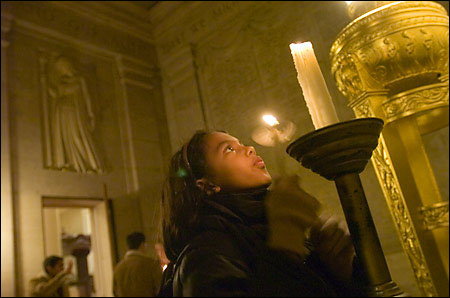
“Your contributions are very important to the millions of displaced people whose lives are still at stake, and who are in great need of support before the cold of winter sets in,” Summers wrote.
Mir, who comes from Kashmir, the area most affected by the quake, spoke about how the disaster has impacted her family and friends and described the dread she feels as she pictures the scenes of devastation that will confront her on her impending visit home.
Her voice breaking with emotion, Mir asked the community she has become part of at Harvard to please help rebuild her home in Kashmir.
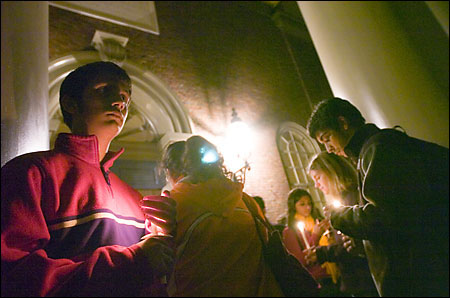
Perhaps the feeling that permeated the event was best summed up by Asim Ijaz Khwaja, assistant professor of public policy at the Kennedy School, who said that it was not enough to grieve with the sufferers or even to feel empathy with them.
Khwaja hoped “the humanity that brought us together today will translate our vigil into action. Only if we demonstrate how much we care will this vigil have real meaning.”
Film screening, concert fundraisers are planned
Pakistani-American activist and rock star Salman Ahmad will screen and discuss his award-winning film, “It’s My Country Too,” on Nov. 29 at 5 p.m. in the Thompson Room of the Barker Center. A Q&A session about Ahmad’s activism and recent trip to the earthquake-torn regions of Pakistan will follow. Later that day, Ahmad will perform songs from his new solo album, “Infiniti,” for a benefit concert for the victims and survivors of the South Asian earthquake. The “Beyond Borders” concert, which will chronicle musical styles from the region, begins at 8 p.m. in the Memorial Church.
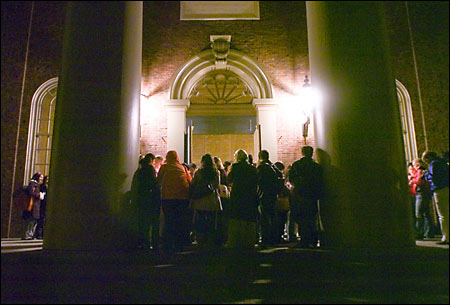
Both events are free and open to the public, but donations for the relief and rehabilitation efforts for the affected areas of the South Asian earthquake are encouraged. Nearly 80,000 people have already died and a massive second wave of death is expected if efforts are not stepped up to help the millions made homeless by the earthquakes and who now face the Himalayan winter.
Sponsoring the Nov. 29 events are the South Asia Initiative, the Office for the Arts, Harvard’s Department of Sanskrit and Indian Studies, the Islam in the West Program, the Pluralism Project, the Center for the Study of World Religions, Harvard Divinity School, the South Asia Association, Dharma, Harvard Islamic Society, and Harvard College Interfaith Council.




